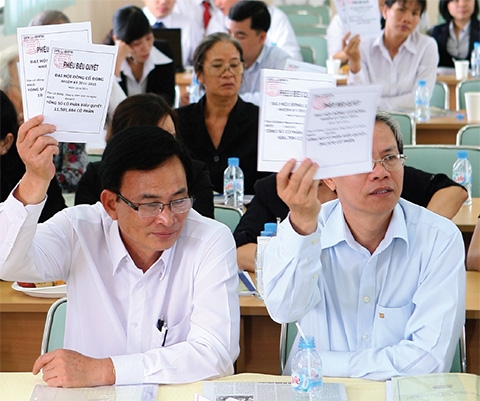Share question needs answers
 There has been much debate in emerging and frontier economies over recent years concerning the issue of increasing foreign ownership limits through issuance of non-voting securities.
There has been much debate in emerging and frontier economies over recent years concerning the issue of increasing foreign ownership limits through issuance of non-voting securities.
As Vietnam enters this debate, it is time to take a closer look at some of the results of such changes in other economies which have proven fruitful to investors.
Each time a company issues securities (voting or non-voting), it essentially forms a contract with investors to maintain some level of corporate governance. Investors are generally aware that the company charter is the underlying governing document which provides representations of the management. When considering this issue of capital stock, it is imperative that investors consider the issue to be one closely related to corporate governance. Corporate governance relates to the relationship of all stakeholders in a company.
Genuine concerns have been raised by local and foreign investors in emerging and frontier markets who believe that stakeholder rights and corporate governance practices are lacking. Vietnam is considered to have mediocre corporate governance practices. In emerging countries like Vietnam, an improvement in corporate governance practices could conceivably lead to increased international investment awareness as investors from around the world become more comfortable with investing in Vietnam. Typically, as a country has increased corporate governance practices, foreign investor inflows have increased because foreign investors are accustomed to a higher level of corporate governance.
Utilising the past experience of other markets around the world that have instituted voting and non-voting shares might be helpful in determining the result of such an action in Vietnam. Researchers have done extensive work to determine the effect of dual common equity class model. Empirical studies from all over the world, as stated by Richard Saito, have determined that voting shares trade at a 5 to 20 per cent premium over non-voting shares. This disparity will likely cause foreign investors to continue to seek the voting shares, even at a premium, if the voting rights are deemed useful and necessary by the foreign investor.

Vietnam is mulling over whether foreign ownership limits
should be raised via issuance of non-voting securities has stired
One such market that is more developed than Vietnam but is similar is the Korean market. The Korean market, for example, is comprised of two types of shares outstanding: a one share-one vote common stock and a non-voting stock called ‘1 per cent preferred stock’. If we consider the more developed Korean stock market as an example of a market where two types of shares outstanding exist which primarily differ in voting rights, a study conducted by K.
Chung and J-K Kim found that there is a premium attached to the voting stock in relation to the relative price of the non-voting stock. The reason for the price discrepancy, they concluded, was because the voting stock reflected a premium similar to shares representing control. Since the preferred shares did not carry voting rights, the preferred share owners had no right to intervene in corporate decisions and essentially were not represented from a corporate governance standpoint. In Korea, it is common for foreign investors to gravitate toward the voting shares.
Another market that is similar to Vietnam and not as developed as the Korean market is the Brazilian market. The Brazilian market is another market that utilises a dual common equity class model. There are voting and non-voting shares on the market. Saito, who has studied the Brazilian market in this context, indicated that liquidity of preferred (non-voting shares) is low and if preferred shares were more liquid, the premium would be lower compared to that of voting (ordinary) shares. The low liquidity indicates a general lack of interest in the non-voting shares. Concern over the ability to exit a position given the low liquidity of the non-voting shares might limit the foreign interest in non-voting shares.
The Russian market is another market similar to the markets in Vietnam. Muravyev studied the Russian market which also utilises a dual common equity class model. His studies have shown that there is a large premium paid on common shares which have voting rights over those shares of preferred which do not have voting rights. Liquidity of preferred shares was also a problem; premiums were considered a result of the fact voting shares could be accumulated to maintain or gain control of the firm.
In virtually all markets around the world that have instituted a dual common equity class model, there is a disparity between the price of the voting and non-voting stock. Exceptions to this rule are countries that have given no voting rights to foreign investors, thereby creating a stock market whereby foreigners cannot obtain any voting rights. Foreign investors’ only choice in these markets is to purchase the non-voting shares and therefore no price discrepancy can exist.
History, as explained in this article, has not favoured the use of a dual common equity class model for investors. Therefore, such implementation must be carefully considered in Vietnam before undertaken.
What the stars mean:
★ Poor ★ ★ Promising ★★★ Good ★★★★ Very good ★★★★★ Exceptional
Latest News
More News
- Cashless payments hit 28 times GDP in 2025 (February 04, 2026 | 18:09)
- SSIAM and DBJ launch Japan Vietnam Capital Fund (February 04, 2026 | 15:57)
- Banks target stronger profits, credit growth in 2026 (February 04, 2026 | 15:43)
- Vietnam on path to investment-grade rating (February 03, 2026 | 13:07)
- Consumer finance sector posts sharp profit growth (February 03, 2026 | 13:05)
- Insurance market building the next chapter of protection (February 02, 2026 | 11:16)
- NAB Innovation Centre underscores Vietnam’s appeal for tech investment (January 30, 2026 | 11:16)
- Vietnam strengthens public debt management with World Bank and IMF (January 30, 2026 | 11:00)
- Corporate bond market poised for stronger growth cycle (January 28, 2026 | 17:13)
- Vietnam's IPO market on recovery trajectory (January 28, 2026 | 17:04)
















 Mobile Version
Mobile Version